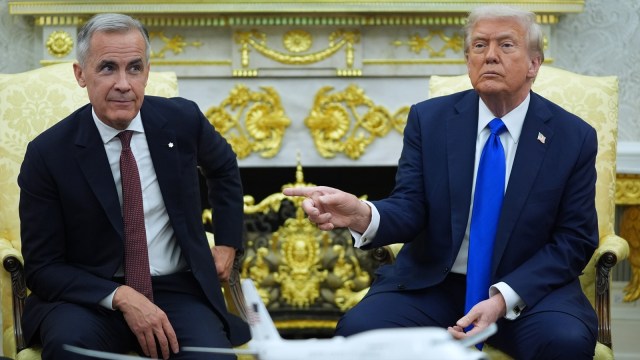Trump rules out restarting US-Canada trade talks after Ontario ad row
Speaking on Friday, Trump reiterated that the United States “will not restart” discussions with Ottawa, despite growing pressure from within Congress and a Senate resolution passed Thursday seeking to roll back his Canada tariffs.
 President Donald Trump and Canadian Prime Minister Mark Carney meet in the Oval Office of the White House, in Washington. (AP Photo)
President Donald Trump and Canadian Prime Minister Mark Carney meet in the Oval Office of the White House, in Washington. (AP Photo) US President Donald Trump has ruled out resuming trade talks with Canada, a week after abruptly cancelling negotiations in response to an anti-tariff advertisement aired by Ontario’s provincial government.
Speaking on Friday, Trump reiterated that the United States “will not restart” discussions with Ottawa, despite growing pressure from within Congress and a Senate resolution passed Thursday seeking to roll back his Canada tariffs.
The resolution—backed by four Republican senators, Rand Paul, Lisa Murkowski, Susan Collins, and Mitch McConnell—was approved by a narrow 50–46 vote. It seeks to overturn the emergency declarations Trump invoked in July to justify his trade measures.
Although largely symbolic, the bipartisan move underscores rising unease within Trump’s own party as tariffs continue to drive up prices for key commodities and consumer goods. Democratic co-sponsor Senator Tim Kaine said the resolution was intended to send a message to the president. “When he sees Republicans starting to vote against his policies, even in small numbers, that makes an impression on him,” Kaine told reporters.
The vote took place while Trump was on a five-day trip across Asia, including Malaysia, Japan, and South Korea. Speaking to reporters aboard Air Force One, he said he had a “very nice” conversation with Canadian Prime Minister Mark Carney during a dinner in Seoul, but offered no details. The remarks came a day after he declared that trade negotiations with Canada were “over.”
The standoff follows a television ad from Ontario that criticised Trump’s tariff policy by quoting former US President Ronald Reagan. Trump reacted angrily, accusing Ottawa of trying to “influence Supreme Court decisions” through “foreign propaganda.”
“TARIFFS ARE VERY IMPORTANT TO THE NATIONAL SECURITY, AND ECONOMY OF THE USA,” Trump posted on social media, confirming that Washington would end all ongoing trade discussions with Canada.
Currently, the US has a 35% tariff on all Canadian goods—with some exemptions under the Free Trade Agreement—and additional sector-specific tariffs, including 50% on metals and 25% on automobiles.
The Supreme Court will hear arguments on 5 November in a closely watched case that could determine the legality of Trump’s sweeping global tariffs—a cornerstone of his second-term economic agenda and a major political flashpoint ahead of the 2026 midterms.






